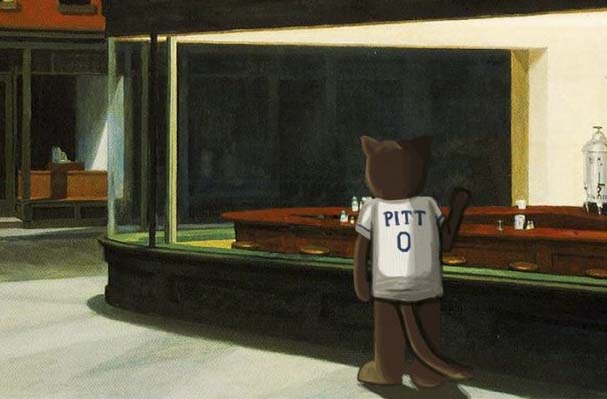Opinion | University shouldn’t remove “Pitt,” “Panther” from club names
Pitt’s new policy regarding branding will strain small clubs’ resources.
September 5, 2019
Student organizations at Pitt might have to rebrand themselves, thanks to a new University policy.
The policy could force hundreds of student organizations to remove the words “Pitt” and “Panther” from their official logos and names. The organizations would be able to distinguish themselves from other national groups of similar names by using “at Pitt” or “at the University of Pittsburgh” in their official names. Pitt’s attempt to control every aspect of a club is insulting to the student-run organizations in accordance with Pitt policies and will be devastating to their brands.
Pitt student organizations are separate entities from the University, so the University has legal power to mandate how its intellectual property — trademarks, patents and copyrights — is used. While legally separate entities, student organizations are still subject to University rules.
Registration guidelines for student organizations say that independent student organizations do not represent nor are part of the University and that the off-campus activities of said organizations are the “sole responsibility of the organization, officers and members.”
While the registration guidelines make it clear that clubs aren’t a part of the University, they also require that these groups maintain a close connection to the University. They must be comprised of at least three-fourths currently enrolled Pitt students and have a full-time faculty or staff advisor to be recognized. These organizations are managed by the Student Organization Resource Center, which gives many groups funding, and are so closely connected to Pitt that it makes sense for them to be allowed to carry the University’s name.
This isn’t the first time the University has tried to disassociate itself as much as possible from student organizations by removing all trademarks. Only three years ago, the University implemented new requirements on logo designs, which mandated that organizations must adhere to strict designs, such as using Helvetica Bold font and placing “Pitt” above the organization name. This second design change within four years is putting unnecessary strain on the resources of clubs, since all designs on stickers, posters, table mats for the activities fair and letterheads must be redesigned and reprinted.
Justin Fernsler, the technical director of Panther Racing, said members of his club are concerned that changing their name would affect their name recognition as well as their relationship with sponsors.
“We have a lot of expensive equipment and a lot of our stuff is branded as Panther Racing, too,” Fernsler said. “Depending on how far they want to take it, we might have to replace a lot of equipment.”
While larger clubs are going to be hit financially, smaller clubs will also carry the burden of rebranding. Kayla Ortiz, president of Pitt Bioethics Society, said that she is concerned about changing the way her club must present itself to the student body.
“We just redesigned our logo last year and now we are going to have to re-edit it,” she said. “We also have a Facebook group and Twitter so we are going to have to go through and make sure that those accounts have the appropriate naming. It’s clunky too. ‘Pitt Bioethics Society’ is already a big name, and now ‘Bioethics Society at the University of Pittsburgh’ — it’s going to be so clunky.”
Ortiz’s club is one of hundreds that will have to spend needless time and resources redesigning their brands. A petition on behalf of University organizations on change.org, which has accumulated more than 700 signatures, echoes these concerns.
“Many students dedicate their entire campus life to representing their school through these organizations and must be able to continue to do so,” the petition says. “Additionally, organizations have invested school allocated money in building their professional image through their names and are recognized sometimes internationally by their name.”
Pitt Archery President Julia Lam said in an email that changing her club’s name would change the branding of the club, but also the image the club portrays. Pitt Archery has competed at the U.S. Indoor National Championships and Outdoor Collegiate Nationals in the past, and won All-Academic and All-American awards. Plenty of other clubs at Pitt have represented the University at conferences, contests and competitions at the state, national and international levels, bearing the words “Pitt” or “Panther.”
“I founded the team and am proud of my past 3 years’ work on developing this club’s brand recognition within USA Archery, and changing it now would feel like a loss,” Lam wrote. “Our leadership has been discussing options to change our name in a way that would comply with the new rules but still preserve the identity of the club and are waiting to hear more about this development.”
Regardless of their independent status, these student organizations have put in the work to show that that belong to and represent Pitt. Yet Pitt is being unrelenting in its attempt to micromanage every organization on campus. The University should allow student organizations, whether they are independent entities or not, to use “Pitt” in their names and logos.
Hayden primarily writes about politics for The Pitt News. Write to Hayden at [email protected].








